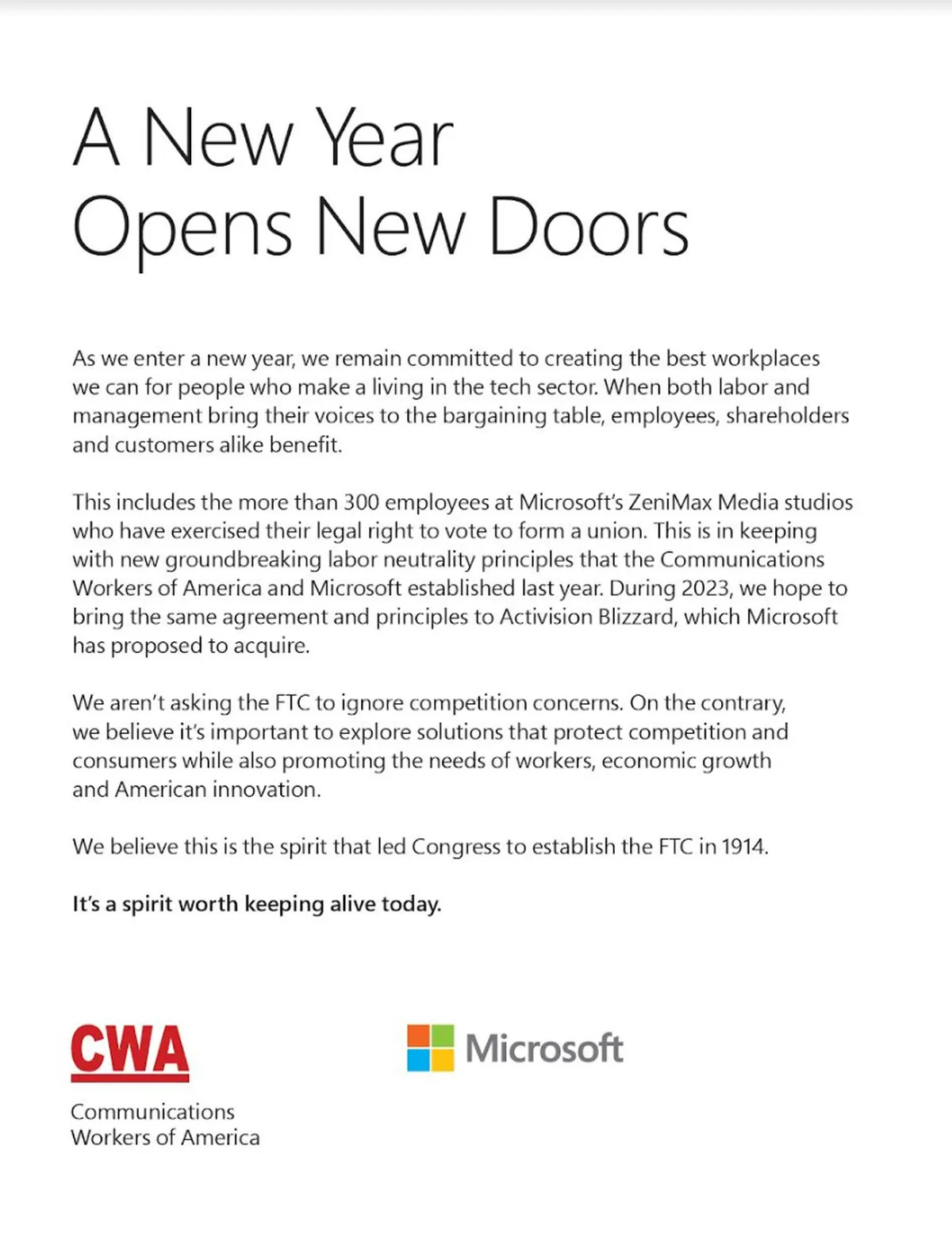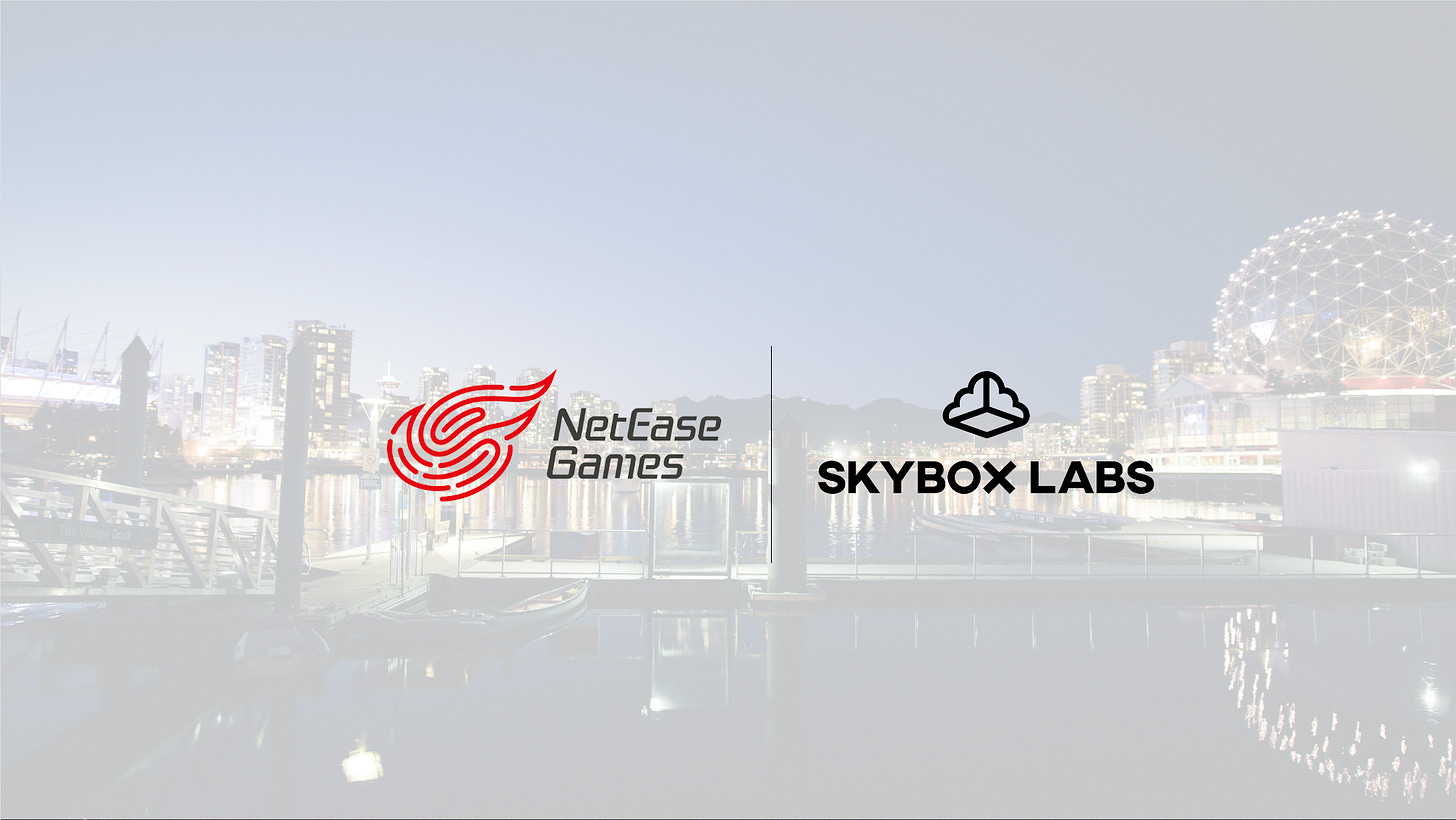Stuff Worth Knowing for the Week of January 2, 2023
CES 2023 begins, ZeniMax's first union rises, and Samsung struggles.
Welcome back to Stuff Worth Knowing! Each week, I'll round up news related to tech, video games, film, television, anime, and more. At the end of each newsletter, there will be a section called On The Calendar, which will include some of those notable dates that are near-term. Oh, and I also launched my Patreon, SavePhile, where my more thoughtful musings on any topic will go.
2023 begins!
Video Games 🎮
PlayStation 5 Reaches 30 Million Sold As Shortages End
This week marked CES 2023, where the biggest tech companies show their best and most aspirational future technology. Sony was there with a full press conference where the PlayStation side of the company got a chance to shine. First up, Sony Interactive Entertainment president Jim Ryan announced that the PlayStation 5 has reached another sales milestone.
“PS5 supply improved towards the end of last year,” Ryan stated. “I’m happy to share that December was the biggest month ever for PS5 console sales, and that we’ve now sold more than 30 million units through to consumers worldwide. Everyone who wants a PS5 should have a much easier time finding one at retailers globally, starting from this point forward.
Microsoft hasn't talked about Xbox Series X or Series S sales numbers for years, making it hard to make a direct comparison. "I know it seems manipulative and I’ll apologize for that," Xbox boss Phil Spencer told The Guardian in 2020. "We publicly disclose player numbers. That’s the thing I want us to be driven by, not how many individual pieces of plastic did we sell.”
In contrast, the Nintendo Switch — technically an eighth-generation console — has sold 114 million units. Whole different ball game.
Sony Announces Project Leonardo Accessibility Controller Kit
At CES, Sony also announced a new accessibility controller kit code-named Project Leonardo. In a blog post released after the announcement, Sony Interactive Entertainment Senior Vice President, Platform Experience Hideaki Nishino explained that the controller should allow players with disabilities to enjoy PlayStation 5 experiences. (Now that they can actually find one.)
The hardware is fully customizable, with modular buttons and button caps, and different layouts for the analog sticks. This is alongside software customization, with extensive button mapping and control profiles on the PS5 itself. The Project Leonardo controller can be used alone, or in tandem with another Leonardo controller or a DualSense controller. Unfortunately, there is no projected price or release date for the controller.
Why It's Worth Knowing: More accessibility is always a good thing. Not everyone plays in the same way or has the same physical capabilities and controllers like Project Leonardo or the Xbox Adaptive Controller allow more folks to enjoy games.
Microsoft Apologizes For Calling The FTC "Unconstitutional"
Last week, we talked about Microsoft's legal responses to the Federal Trade Commission (FTC) and UK Competition & Markets Authority (CMA) over the potential Activision-Blizzard acquisition. I noted that Microsoft was making some… interesting arguments about the FTC exercising "significant executive power" and calling the internal commission "unconstitutional."
This week, Microsoft walked back some of that commentary. The company refiled its responses to the FTC removing many of the heated statements. A spokesperson stated that the incendiary language was on the table internally, but should've been removed in the final document.
“The FTC has an important mission to protect competition and consumers, and we quickly updated our response to omit language suggesting otherwise based on the constitution,” Microsoft public affairs spokesperson David Cuddy told Axios.
On the other side of the pond, the CMA has extended the deadline for its investigation into the Activision-Blizzard deal. It was scheduled to publish the report on this phase of the investigation on March 1, 2023. According to Gamesindustry.biz, the deadline was extended to April 26, 2023.
Things are looking up for Microsoft's employees, and potentially Microsoft itself, thanks to our next news item...
Zenimax QA Union Approved and Lauded By Microsoft
On January 3, Microsoft approved the union formed by 306 quality assurance workers of ZeniMax Media, following a vote by those workers. The union is now a part of the Communications Workers of America and its next step is to assemble a bargaining committee.
“In light of the results of the recent unionization vote, we recognize the Communications Workers of America (CWA) as the bargaining representative for the Quality Assurance employees at ZeniMax. We look forward to engaging in good faith negotiations as we work toward a collective bargaining agreement," Microsoft public affairs spokesperson David Cuddy told The Washington Post.
Microsoft offered the CWA a labor neutrality agreement back in June of last year, pledging to not stand in the way of any labor unions at Activision-Blizzard. The agreement made the CWA an ally in Microsoft's attempted acquisition of Activision-Blizzard. That allyship was on full display this week, when the CWA and Microsoft took out a full-page ad in The Washington Post.
"During 2023, we hope to bring the same agreement and principles to Activision Blizzard, which Microsoft has proposed to acquire. We aren’t asking the FTC to ignore competition concerns. On the contrary, we believe it’s important to explore solutions that protect competition and consumers while also promoting the needs of workers, economic growth and American innovation," said the joint ad.
Why It's Worth Knowing: Microsoft isn't making these labor moves out of the kindness of its heart. It's doing so because these labor moves make the company look better for the acquisition. The CWA is a card Microsoft can play to say, "Hey look, we're the good guy." The CWA knows this, but it's good to use that leverage to get workers better rights.
Square Enix's President Recommits to Blockchain Tech
While a good chunk of the gaming industry has run screaming from blockchain and NFT technology, it seems like Square Enix is going to try and make it work. In his "New Year's Letter from the President," Square Enix president Yosuke Matsuda recommitted to his company's embrace of several Web3 technologies, including blockchain, NFTs, and crypto-currency.
Matsuda noted many of the issues surrounding cryptocurrency in 2022, notably the fall of FTX. Despite this, he believes there's still a future in the tech for gaming purposes.
"Our Group has multiple blockchain games based on original IPs under development, some of which we announced last year, and we are undertaking preparations that will enable us to unveil even more titles this year," he states. "We are also engaged in global sourcing from an investment perspective and will continue to take stakes in promising businesses whether we find them in Japan or abroad. Blockchain has been an object of exhilaration and a source of turmoil, but with that in the rearview mirror, we hope that blockchain games will transition to a new stage of growth in 2023."
Matsuda also talks about decentralization in terms of gaming. "We consider traditional gaming to have been centralized, then blockchain gaming must operate based on a self-sustaining decentralized model," he says. How exactly Square Enix is going to make money on a decentralized model, which theoretically would remove control from its hands? I'll be interested to see how that works out.
Why It's Worth Knowing: Companies are going to keep trying to make blockchain and NFT gaming work in the future. There's just too much speculative money floating out there to not at least turn their eyes in that direction. That said, Square Enix is one of the larger publishers aimed at Web3, and Matsuda openly loves the idea of the technology. They have a good chunk of money to work with thanks to the sale of the Western studios, so it'll be interesting to see where Square Enix' NFT and blockchain hopes end up.
Games Done Quick Founder Steps Down From Leadership Of The Event
Games Done Quick founder Mike Uyama is stepping down from leading the speedrunning event. Uyama started the event thirteen years ago and it's grown into multiple events each year, each one raising money for a variety of charities. The last major event, Summer Games Done Quick 2022, raised $3 million for Doctors Without Borders.
"So AGDQ 2023 marks my 13th year of GDQ. I’ve been at it for a long time, and I decided it’s time for me to take a break," Uyama told The Verge. "I realized that I need to take care of my health and kind of focus on different activities."
The next event is Awesome Games Done Quick 2023, happening online from January 8-15, 2023. Matt Merkle will take over as the head of GDQ. He's pledged to continue expanding the event and bringing new games to GDQ. "We started asking the community for more outside-the-box runs," Merkle said. "So we’ve had more rhythm games in recent events, and we’re experimenting with VR games at events. We’ll have Half-Life: Alyx at [GDQ 2023]. I’m really excited for that."
NetEase Games Acquires SkyBox Labs
NetEase Games has acquired another studio as it seeks to grow its international game development ambitions. This time, it has acquired SkyBox Labs. You may not know the studio from its own titles like the Apple Arcade platformer Stela, but you likely know many of the games it has partnered on, including Halo Infinite, Minecraft, Magic The Gathering Arena, and Fallout 76. SkyBox Labs was largely a support studio, similar to Nixxes, Bluepoint Games, or Climax Studios. It helped 343 Industries with Halo 5's Forge mode and Xbox One X enhancements, and ported Minecraft over to Nintendo Switch.
According to the official website, SkyBox Labs will continue to partner with other studios in the future. The new resources from NetEase will be used to expand operations, following the planned addition of three more studios in August of last year.
"We have built a team of talented individuals who are passionate and creative, and by joining NetEase Games, we will also be able to accelerate our plans to pursue new creative opportunities, and enjoy access to world-class operational resources and the full breadth and depth of NetEase’s services so we can scale faster in Canada," said the official press release.
Why It's Worth Knowing: NetEase is doing its best to establish a presence in other markets outside of its home region of China. It acquired Quantic Dream last year and launched two U.S.-based studios, following its 2022 opening gambit of poaching Ryu Ga Gotoku Studio veteran Toshihiro Nagoshi to start a new studio in Japan. There currently haven't been any results from these moves, but the company is spending big to create a foundation.
Tech ⌨️
HTC's New Mixed Reality Headset Is $1,099
Sigh. It feels like we're moving in the wrong direction in regards to mixed reality. HTC has been teasing its next virtual reality headset for a month now and the company finally revealed it at CES 2023. The device is the Vive XR Elite, a $1,099 headset built for virtual reality and augmented reality applications similar to the Meta Quest Pro.
The XR Elite is a lightweight headset with a resolution of 1920×1920 pixels per eye at 90Hz, with a field of view of up to 110 degrees. It's powered by the Qualcomm Snapdragon XR2, the same chip inside the Meta Quest 2, alongside 12GB of memory and 128GB of storage. The battery is attached to the back of the headset, letting you use it as a standalone device in addition to the PC connection over USB-C. And it looks well-designed, at least.
Why It's Worth Knowing: HTC is making the same bet that Meta made with the Quest Pro: that the future is in augmented reality as much as it's in virtual reality. I think both are clearly afraid of Apple, which is currently planning an "extended reality" headset. Apple's Reality Pro/One headset is rumored to be powered by the M2 chip and cost anywhere between $2,000 and $3,000. Once you dial into that price, you see where Meta and HTC are headed. $1,000+ looks bad in comparison to something like the Quest 2, but it's really good against Apple's potential offering.
The problem is the Quest 2 was the right product for mass-market appeal and Meta isn't building on it. Bytedance and others are with headsets like the Pico 4, but they lack the scale to really provide an ecosystem around their offering. Meta has the Quest 3 planned for this year, it's just taking forever to get here. (That headset is also rumored to be mixed reality, like the others mentioned above.)
Also, Meta and HTC attempting to compete with Apple without acknowledging why Apple will leap ahead: it'll make sure the ecosystem is amazing. Meta has the strength to compete on ecosystem and price, but the Pro isn't where it should be playing in my opinion.
AMD Reveals Ryzen 7000 X3D CPUs For February Release
A lot of the big desktop hardware releases happened last year, with AMD, Intel, and Nvidia offering some of their flagship products over the holiday season. AMD saved a little heat for 2023, however. At CES, AMD announced the Ryzen 7 7800X3D, Ryzen 9 7900X3D, and Ryzen 9 7950X3D. These new processors include AMD's 3D V-Cache technology, which stacks silicon in a "chiplet" form for increased power and energy efficiency.
The top-end Ryzen 9 chips sport high clock speeds and 150MB of on-chip memory, theoretically making them strong contenders in multi-threaded workloads and gaming. The processors will be released in February 2023. No prices were given for the three chips, but the standard retail prices for the non-3D versions of the 7950X and 7900X are currently $699 and $549. Expect them to be slightly higher.
AMD also announced its new non-X processors: the Ryzen 5 7600, the Ryzen 7 7700, the Ryzen 9 7900. All three chips are weaker than the already-released X processors, but are extremely energy efficient with a 65-watt TDP (thermal design power). If you're building a low-power desktop, these models might be more your speed.
Samsung Hints At a Rocky Fourth Quarter
A big reason behind the season of layoffs is companies doing their best to find revenue in rocky market conditions. Case in point, Samsung released its guidance for the fourth quarter of 2022, posting one of the worst quarters in many years. By these estimates, sales are taking a small dip, landing at 70 trillion KRW ($55.8 billion), down from 76.57 trillion KRW ($61 billion) in the fourth quarter of 2021.
The real pain point is operating profit, which has dropped to a staggering 4.3 trillion KRW ($3.4 billion). That's compared to 13.87 trillion KRW ($11 billion) in the fourth quarter of 2021, and 10.85 trillion won ($8.65 billion) in the third quarter of this year. Basically, Samsung is taking hits from all directions. According to Reuters, it's the worst quarter the company has posted since the third quarter of 2014.
Why It's Worth Knowing: Samsung has its fingers in enough pies — chip making, smartphones, televisions, appliances, and more — that it's seen as a bellwether for the rest of the industry. If things are going bad for Samsung, it's likely going bad for everyone. And oddly enough, laying off scores of employees merely adds to the problem. No job, no extra spending.
This Week In Twitter: Rolling Back Ad Guidelines and Old Hacks
This week, Twitter continues to be mostly quiet. On January 3, the official Twitter Safety account announced that the company is relaxing its ad policy in regards to "cause-based advertising," allowing more political ads on the platform. This is likely because ad revenue is drastically down at the company and it needs all the ads it can get.
"We believe that cause-based advertising can facilitate public conversation around important topics. Today, we're relaxing our ads policy for cause-based ads in the US. We also plan to expand the political advertising we permit in the coming weeks," said the account on Twitter. "Moving forward, we will align our advertising policy with that of TV and other media outlets. As with all policy changes, we will first ensure that our approach to reviewing and approving content protects people on Twitter. We'll share more details as this work progresses."
The other bit of Twitter news is the leak of records related to 235 million Twitter accounts. The leaks involved email addresses and account names, allowing some Twitter accounts to be linked to real-world identities and vice-versa. BleepingComputer was one of the first sites to cover the recently-released data.
While one might be quick to lay the hacked information at the feet of new owner Elon Musk, the data likely came from a January 2022 vulnerability that the company revealed in August of last year. That data has been circulating around the internet for a while, and this is likely a part of that information. Troy Hunt, creator of HaveIBeenPwned, a site which allows users to check if their email addresses or phone numbers are a part of leaked data, said the information looks to be of around 211 million unique email addresses tied to account names.
This Week In Layoffs: Amazon Cuts 18,000 and Salesforce Cuts 10%
I've written about layoffs enough since I've started this newsletter that I figured I'd just start consolidating these stories into one section, similar to "This Week in Twitter". There's two big ones this week.
First, Amazon has announced that it's cutting 18,000 employees. Most of the cuts are being made to Amazon Stores and the People, Experience, and Technology (PXT) division. The company plans to notify the affected employees starting on January 18. "These changes will help us pursue our long-term opportunities with a stronger cost structure; however, I’m also optimistic that we’ll be inventive, resourceful, and scrappy in this time when we’re not hiring expansively and eliminating some roles," said Amazon CEO Andy Jassy in his message to employees about the layoffs.
The second set of layoffs affect Salesforce, the software company that powers a number of businesses. According to the New York Times, the company is laying off 10% of its workforce, or around 8,000 employees. Like Jassy, Salesforce CEO Marc Benioff said that the company likely grew too big during the boom of the pandemic, only to have too many employees during the current economic slowdown.
Film, Television, and Streaming 🎞️
HBO Max Loses Looney Tunes Episodes As WBD Promises Not To Cut Anymore Shows
On Tuesday, Vulture was the first to notice that 256 episodes of the classic Looney Tunes show were gone from HBO Max. Variety followed that with a report that a number of Flintstones episodes were also gone from the service. In total, Seasons 16-31 of Looney Tunes and Seasons 4-6 of the Flintstones have left the service. According to Variety, the episodes in question were licensed to HBO Max from Warner Bros. That deal ended in 2022, and Warner Bros. discovery decided simply to not re-license the content to itself.
It's a bizarre move, because these are the latter seasons of these two shows. Even if you want to license them out, you're going to need to license the whole thing, not just the latter halves. As it stands, half of these shows that WBD owns are just gone, rather than sitting on its own streaming service.
Two days later, Warner Bros. Discovery CFO Gunnar Wiedenfels promised that there would be no more content write-offs. The company surprised everyone last year by cutting completed films and shows, including the planned Batgirl film. These moves preceded the slow removal of existing shows from the platform.
"We took a little bit of time to make sure that we do it properly. For some of the titles, we’ve found new homes elsewhere. That’s why this took six or seven months. But I think we’ve come to great solutions and, most importantly, we’re done with that chapter," said Wiedenfels at Citi’s 2023 Communications, Media & Entertainment Conference, according to Variety. "I think the team has laid a great foundation and I’m really excited about the growth from here."
Why It's Worth Knowing: I quibble with Wiedenfels' assertion that the cuts were done properly, but WBD needed to cut costs. The issue is that the company is planning to launch Max, the merged streaming service combining HBO Max and Discovery+, but these cuts have viewers wondering: what Max is going to have? It's eroding trust at a time when the company probably needs to build trust. Disney has its own problems, but viewers trust that most things Disney are on Disney+. If Max doesn't have that, what does it have?
Books 📚
HarperCollins Intends to Hire Temp Workers As Strike Continues
Many of HarperCollins' employees have been on strike since November 10, 2022. The HarperCollins Union, a part of the United Auto Workers, walked off the job demanding increased starting salaries, a further commitment to diversity in the workplace, and more security for workers. The employees come from the editorial, design, marketing, and legal departments, usually consisting of entry- or mid-level staff.
According to the union, HarperCollins is planning to hire temporary workers rather than returning to the bargaining table. "Do you want untrained temps to edit, design, and promote your books? HarperCollins management does, but we know you don't," says one of the tweets.
Many authors, illustrators, and agents have signed an open letter standing with the union. 500 authors also signed a letter to HarperCollins Publishing CEO Brian Murray and HarperCollins Children's Books President Suzanne Murphy in December, according to NPR. The authors who signed the letter committed to leave any HarperCollins editors off their submission lists until the strike was over.
Murray did respond with his own letter to authors and agents, stating that the union's demands, "fail to account for the market dynamics of the publishing industry and our responsibility to meet the financial demands of all our business stakeholders." Back in 2021, HarperCollins posted revenue of $1.985 billion and earnings were up 43%. “We set records in any metric you use,” Murray said at the time. Of course, this was immediately followed by a bad first quarter for fiscal year 2023, which explains why Murray is avoiding union negotiations. Shame on him.
On My Mind 🧠
Nothing on my mind this week, other than going back to work!








